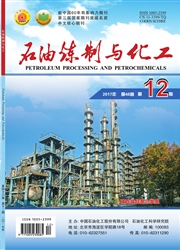

 中文摘要:
中文摘要:
根据介电力学原理,在自行设计的介电动力学精制工艺实验台架装置中,研究了影响加氢柴油中超细固体微粒去除效率的因素。运用油液中固体颗粒物的显微镜计数法,测定了不同条件下加氢柴油中的固体微粒,比对ISO液压传动油液中固体颗粒污染等级代号,确定了精制后加氢柴油的固体微粒等级。研究结果发现,在介电陶瓷的介电常数ε〈12000的范围内,介电精制效率随介电常数的升高而升高,但当ε〉12000后精制效率降低;加氢柴油中颗粒物的去除率随分离电压的增大呈先增加后降低的变化趋势,在分离电压为4000V时介电精制效果最好。在ε=12000、分离电压为4000V、流量为36.4mL/min时,加氢柴油中颗粒物的去除率最大,为99.33%,精制后加氢柴油的固体微粒等级达到2级。
 英文摘要:
英文摘要:
According to the principle of dielectrophoresis(DEP), the factors having effects on the efficiency of removing particles in hydrogenated diesel fuel by DEP process were studied. It was found that the efficiency of particles removal in hydrogenated diesel with DEP process went higher with the increase of dielectric constants of ceramics to a threshold value of 12 000. Beyond the threshold value,the efficiency decreased with further increase of dielectric constants of ceramics used in the process. The effect of separation voltage on refining efficiency was analyzed as well. Under the optimum refining conditions of a dielectric constant of 12 000, a separation voltage of 4 000 V and a flowrate of 36.4 mL/min,the particles removal rate of hydrogenated diesel was as high as 99.33%. After refining, the treated diesel could meet the 2nd class requirement of solid particles standard.
 同期刊论文项目
同期刊论文项目
 同项目期刊论文
同项目期刊论文
 期刊信息
期刊信息
